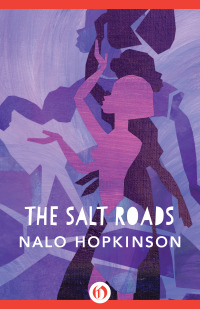
Published in Canada in 2003; published digitally by Open Road Media on January 27, 2015
Nalo Hopkinson is a Jamaican-born Canadian. Some aspects of The Salt Roads incorporate Carribean (particulalry Haitian) mythology. For that reason, The Salt Roads is marketed as a fantasy. Oddly enough, it would be a better novel without the fantasy elements.
The Salt Roads struck me as three separate novels welded together with bulging seams, never quite aligning into a well-constructed whole. Most of The Salt Roads takes place in the mid-nineteenth century. A large part follows slaves on a plantation in Saint-Domingue, the former French colony in the Caribbean. Another large part takes place in the same time frame in Paris. The smallest part takes place in fourth century Egypt. That part is told from the perspective of a Nubian-Greek slave known (among other names) as Meri. Much of the novel is quite strong but it too often adopts elements of mythology that I found distracting.
The best of the stories is the one set in Saint-Domingue. A fellow named Makandal is, depending upon one's perspective, a freedom-fighter or a troublemaker who wants to free slaves by murdering their masters, but the central character in Saint-Domingue is Mer, an aging woman who helps enslaved women give birth and uses traditional remedies to tend wounds and treat illnesses. Part of the story involves a love triangle as Mer and a man named Patrice both hope to bask in the light that radiates from a slave named Tipingee.
A less interesting story concerns a woman in Paris named Jeanne, a third generation whore who hopes that the poet Baudelaire will rescue her from her unfortunate life. The poet's mother, who controls the family's money, does not appreciate Jeanne's dark skin. This is Paris, so writers wander through the text, including Verne and Dumas. That seemed like name-dropping to me; little of it contributes to the story.
In the third plotline, Meri travels to Jerusalem with her gay slave friend. Meri's story in Egypt and Jerusalem provides a mildly interest contrast to the stories in Saint-Domingue and Paris but doesn't amount to much, even after we learn the role that Meri played in Catholic history.
A spirit that is initially hitchhiking within Jeanne's body occasionally narrates short sections of the novel. The opinionated spirit sometimes controls Jeanne's body, sometimes leaves the body entirely to roam free, sometimes travels back in time to inhabit Meri's body, sometimes talks to Mer, but mostly feels trapped, longing to be "liberated to dance forever" with other Africans. The spirit lives in a "flowing world of stories" and her apparent role is to tie the three stories together. I gather that the narrative voice belongs to one of many spirits collectively known as Ezili, the Haitian Vodou spirit of single motherhood (thank you, Google).
Salt -- in the sea, in sweat, as a spice, as the subject of parables, as a substance that weakens the force of magic -- is a symbol that seasons the novel. It is apparently intended as a symbol of defiance and resistance. Salt, we are told, forms the roads of power that will set slaves free.
The quality of Hopkinson's prose is excellent. Like most well-written stories of slavery, parts of The Salt Roads are heartbreaking. Other parts are just strange. Apart from the traveling spirit, the novel gives us talking birds and mermaids that convey messages and warnings. The mermaid is evidently Lasirèn, a mermaid of Haitian mythology (thanks again, Google). Makandal can transform into a bird or animal. He is possessed by Papa Ogu, the Haitian spirit father. I'm always a little rattled when realistic novels suddenly give way to pure fantasy. Using mythology to represent the unifying spirit of all women, the spirit that resists subjugation, is a nice idea but Hopkinson didn't make it work for me, perhaps because I suffer from a literary aversion to Voudu and mermaids. Fans of traditional fantasy may have a different reaction.
The Salt Roads gave me the sense that Hopkinson, overly ambitious, wrote three partial stories, didn't know how to finish any of them, so threw them together with a traveling spirit and called it a novel. Maybe that's harsh since I liked quite a bit of The Salt Roads, but I liked its best elements more than I liked the whole.
RECOMMENDED